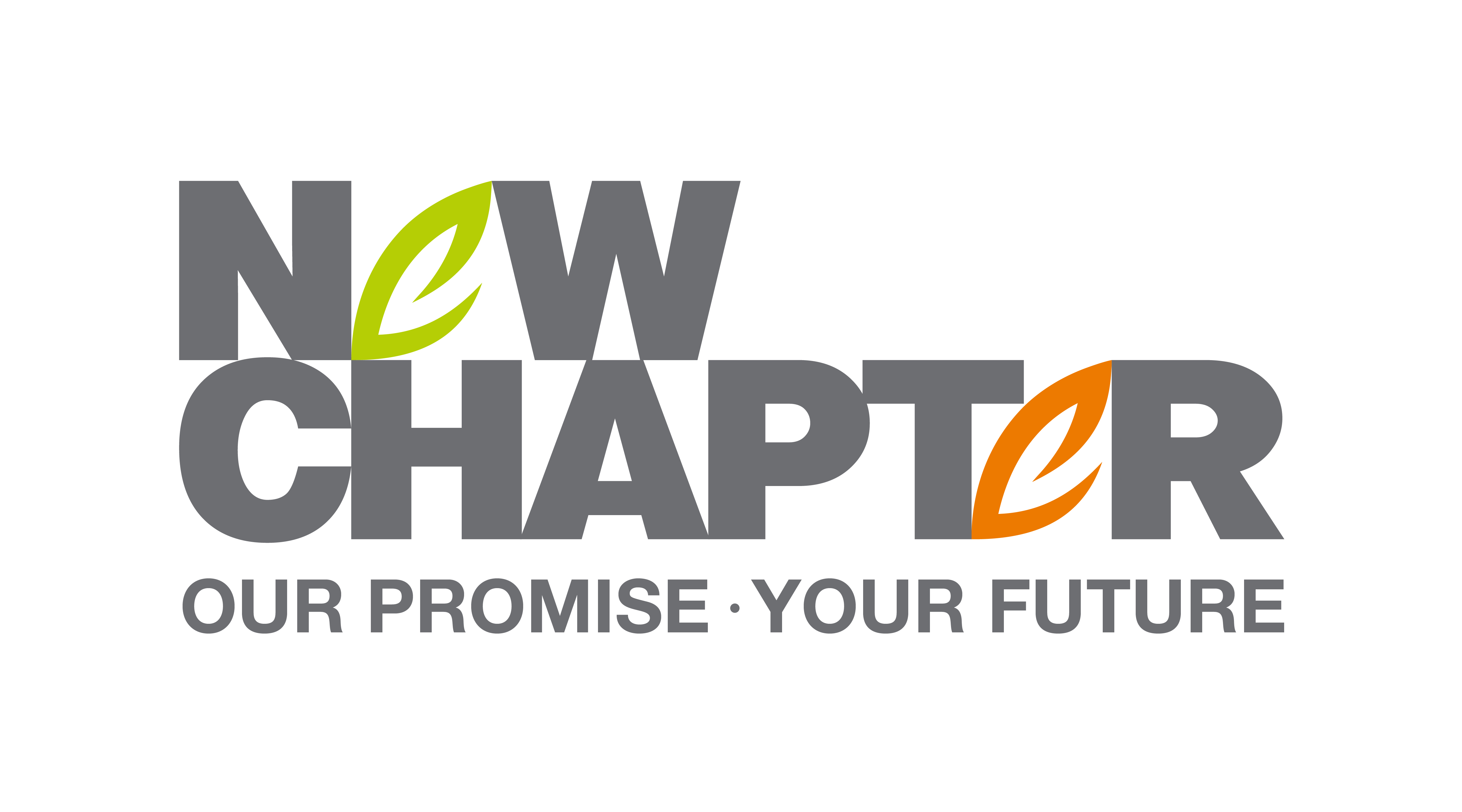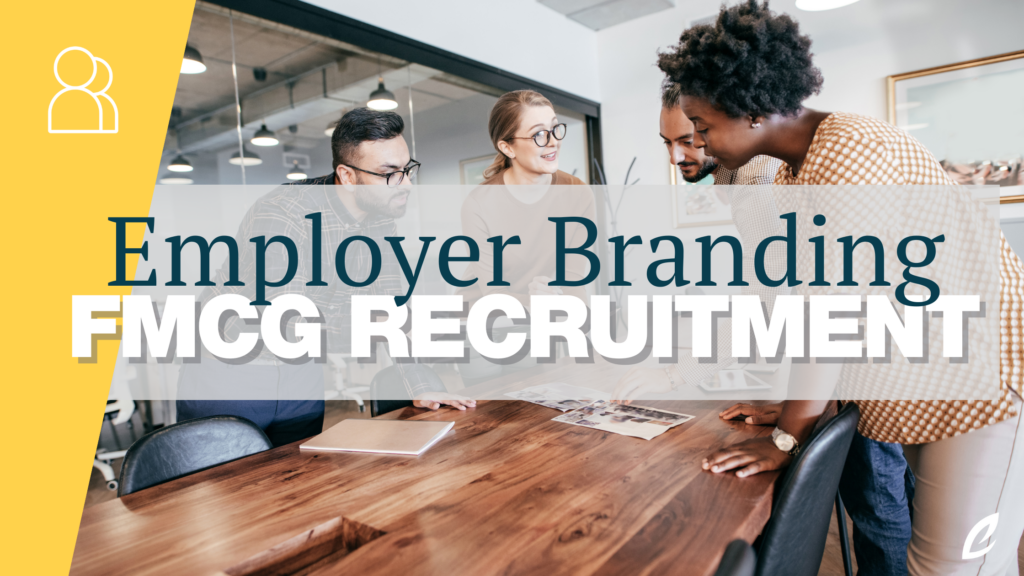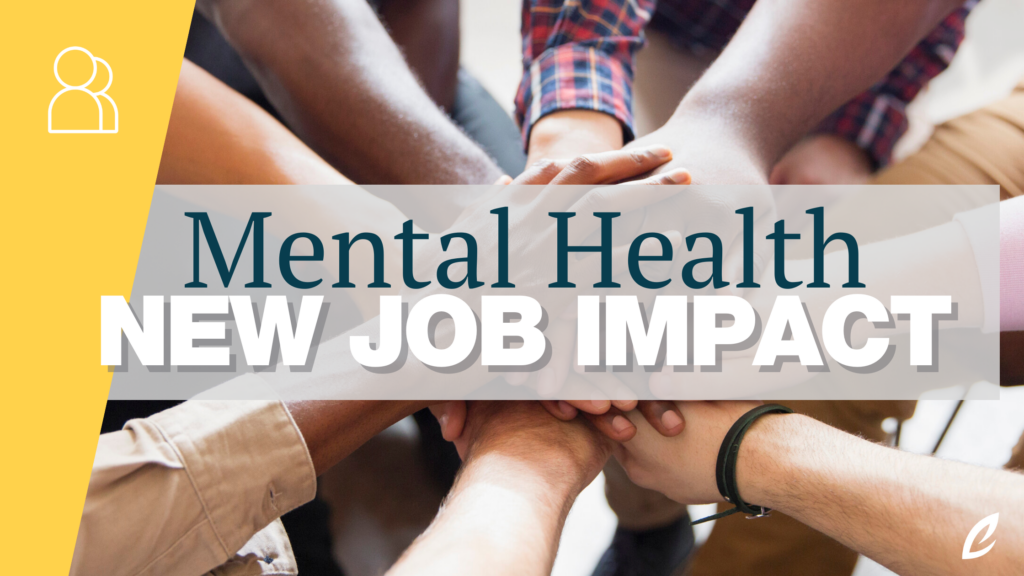Category: Top Tips
-

How To: Stand Out in the Competitive...
Continue ReadingHow To: Stand Out in the Competitive FMCG Market
The Fast-Moving Consumer Goods (FMCG) industry is known for its competition and constant innovation. As a candidate in this highly competitive market, it is essential to differentiate yourself from other applicants in order to secure your dream job.
In this blog, we will explore five effective strategies that can help you stand out and increase your chances of success.
Showcase Relevant Experience
One of the most effective ways to stand out is to demonstrate your relevant experience. Senior Consultant James Howarth says, ‘For me, since I focus on sales roles, I would always make sure that the candidate has a list of financial achievements. At the end of the day, you’re trying to appeal to other salespeople, so being able to quickly highlight your successes can make a strong first impression.’
By quickly highlighting key achievements, it demonstrates your confidence in your abilities and makes you an attractive candidate to potential employers.
People Remember People
Making a lasting positive impression is key when interviewing in the FMCG industry. James Howarth, our Senior Consultant, emphasises the importance of showcasing your personality, saying, ‘People remember people, so getting your personality across and building a quick rapport is paramount.’
This includes showcasing your passion for the industry, role or company. Necessary preparation and research beforehand will allow you to confidently discuss how your experience, passions, and values align with the company’s interests.

Demonstrate your Knowledge
Similarly, to showcasing your experience, the FMCG industry is fast-paced, and employers look for candidates with a good understanding of the markets and who are constantly ready to evolve with trends. Staying up to date with these trends and using this knowledge to your advantage during interviews, can make all the difference in getting your dream role.
Confidence plays a vital role, and in this industry, confidence comes from your knowledge. By staying ahead of the curve, you become a valuable asset to any business.
Highlight Soft Skills
While technical skills and knowledge are essential in the FMCG industry, employers also value candidates with strong soft skills, including effective communication, teamwork and problem-solving. These skills are highly sought-after, and you can highlight them in your CV by providing specific examples of how you have previously utilised them. By demonstrating a well-rounded skill set, you can position yourself above other candidates who may primarily focus on technical qualities.



Networking
This is crucial in any industry, and FMCG is no exception. Attending industry events and joining professional organisations enables you to gain insights, make connections, and potentially secure new job opportunities. Networking can also provide a way to seek advice from experienced professionals in the industry, helping you navigate the competition market effectively.

In this highly competitive market, it’s crucial to stand out from the crowd, and by using these tips, you can position yourself as a top candidate. With dedication, perseverance, and a well-executed search strategy, you can land your dream job.
If you would like further advice on securing your dream role or tips on positioning yourself as the best candidate, feel free to get in touch with us today at info@newchapter.co.uk. Our experienced consultants can guide you through this process!
Recent Blogs
So far this year companies have continued to invent new sustainable packaging options for their brands. Take a look at the most recent inventions.Why Employer Branding is Crucial in FMCG Recruitment
May 22, 2024In today’s competitive job market, where top talent is scarce, employer branding has never been more critical.Mental Health: The Impact of Starting a New Job
May 15, 2024Starting a new job is an exciting but daunting chapter in your FMCG career journey, here are some strategies to support your mental health. -

Supporting Your Employee’s Mental Health
Continue ReadingSupporting your Employees Mental Health
Your employees should feel like they can trust you and openly discuss their mental health. If you understand that mental and physical health are of equal importance, fewer problems will occur.
It is an ongoing critical issue for many companies, and their employees well-being directly impacts the company’s performance and, therefore, its success. In this blog, we will explore the strategies you can adopt to support their mental health.
Create a Supportive Environment
Making sure employees can discuss their mental health will be a huge contribution to a positive work environment. A kind and inclusive workplace can have a huge impact on productivity and mental health.
Organising regular meetings between employees and their managers ensures that problems are not left undiscussed. You could also arrange training and workshops, and use incentives to recognise employees for their hard work. Educating your workforce can have a huge impact on the environment as employees will understand each other’s struggles.

Offer Flexible Work Arrangements
Flexible work arrangements allow for a healthy way for your employees to balance their work and personal life, either through remote work options or flexible leave policies.
These policies help to reduce stress at work and also allow for higher staff retention, as employees are happier in their roles.
Encourage Breaks and Self-Care
People need breaks and self-care to avoid burnout and maintain their mental health. Promoting healthy habits, such as taking breaks during the workday, encouraging physical exercise with gym lunches, and offering mindfulness programs can help. You could also offer resources such as meditation apps and yoga classes.



Support Your Team
Your team of leaders should be approachable and available to encourage the team to speak up about problems.
Management should be tailored to each individual, as some may prefer video, phone, or email communication. Accessible resources should also be offered, and employees should be informed about the resources available to them.
Mental Health Insurance Coverage
Be sure that your health insurance covers adequate support for mental health, including therapies such as massage therapy, acupuncture, and chiropractic care, which can have both mental and physical benefits.

As a company, you have a responsibility to support your employees’ mental health.
By prioritising their mental health, you can improve employee engagement, productivity, and overall well-being, creating a happier workplace environment.Recent Blogs
2024 The Year of Sustainable Packaging
June 5, 2024So far this year companies have continued to invent new sustainable packaging options for their brands. Take a look at the most recent inventions.Why Employer Branding is Crucial in FMCG Recruitment
May 22, 2024In today’s competitive job market, where top talent is scarce, employer branding has never been more critical.Mental Health: The Impact of Starting a New Job
May 15, 2024Starting a new job is an exciting but daunting chapter in your FMCG career journey, here are some strategies to support your mental health. -

Managing Stress | Top Tips
Continue ReadingManaging Stress
Stress is a natural response to the demands of life, and while it can be normal and motivating, excessive stress can have negative effects on your wellbeing. This blog is focused on stress awareness, and our team have shared their personal techniques on how they manage it.
What is Stress?
When faced with a demand or threat, our bodies naturally respond by releasing stress hormones like adrenaline, causing an increase heart rate, blood pressure and breathing rate. While this can be beneficial in the short term, chronic stress can lead to negative impacts on both physical and mental health, including anxiety, depression, and heart disease.
Understanding the significance of stress awareness is crucial to effectively managing it. If you know the symptoms and triggers, you can take the right steps to reduce it. Our consultants have shared their go-to approaches and advice.
"It’ll be okay in the end and if it’s not okay it’s not the end." Adrian DalbyFounder & CEO
Adrian DalbyFounder & CEODog walk & Podcast
Nicky McHaleI love to put on a podcast and taking the dog for a walk! (We have left some podcast suggestions below)Chamomile
Katie O'LearyI suggest making chamomile tea, it’s a known stress and anxiety relief with soothing properties!Morning Routine
Katie LeuwInstead of reaching for my phone first thing in the morning to check social media or email, I start by opening my curtains, brushing my teeth, and feeding my cat.Gym
Cristy JenningsI think going to the gym is so beneficial to manage stress. The gym can help bump up the production of your brain's feel-good neurotransmitters, called endorphins.Yoga
Hannah BuglerMy go to is doing some yoga to relax or a facemask in the evening would be a good way to relax.Relax with friends
Charli HarrisGoing to the gym or a chatting through thoughts with friends over a glass of wine is my go-to’s after a stressful day!Podcast Suggestions


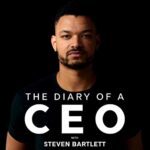





Stress is normal, and to manage it you need to have a natural balance and prioritise selfcare, and how to reduce this by setting boundaries!
If you are struggling with stress in your current role, why not consider finding a new one. Our consultants are happy to have a chat, or you can look through our vacancies below!
-

Are you ready for a new job?
Continue ReadingAre you ready for a new job?
How do you really know when it’s time to leave your current job?
At some point in your career, you may find yourself questioning whether it’s time to explore your options. It’s normal to have moments of doubt and transitioning into a new role can be a daunting decision, but how do you know it’s the right change for you?
With the common saying, “the grass isn’t always greener,” we understand that you need to feel certain before you make that decision. That’s why we’ve prepared a five-step guide to steer you in the right direction. As always, our FMCG consultants are available to answer any questions you may have about starting a new chapter.
1. You feel unfulfilled in your current job
If you no longer believe that your work has a purpose, it can significantly affect your happiness and motivation. While we all need to work to pay rent, it shouldn’t just be about the financial benefits. Work should also come with perks, recognition and a sense of achievement.
It’s important to value yourself, and your employer should do the same. If you feel that your company is falling short on this, it’s essential to address the issue. Shockingly, one-third of all employees in the UK, which is almost 10 million people, feel undervalued at work. This indicates the iminent need for change.
Employers should value your opinions and encourage your personal and professional growth. Their mentoring and support is key for progression. Therefore, if you’re not receiving this within your current role. It’s probably time for a career change or to see if there’s internal opportunities for a new challenge.

2. You’re experiencing a toxic work environment
A negative work environment can have a severe impact on your mental health. Particularly if you’re dealing with a toxic boss, colleagues, or work culture. It’s important to work in an environment where you feel respected and supported. If your company lacks these qualities, it may be time to consider moving on.
Each company also has its unique culture, which may or may not suit you. If there’s a change in management that alters their values, you may struggle to adjust. In this case it’s probably a good time to open up to your manager about your concerns. Or maybe it’s even time to start looking for new opportunities.
3. You have that Sunday night dread
The fear of getting up on a Monday morning for work shouldn’t be a universal experience, but unfortunately, it is for many people.
If you find yourself dreading work, dragging yourself in, struggling to concentrate, and contemplating your career path, you’re not alone as the Indeed Work Happiness Score reveals that 1 in 3 are unhappy at work.
Here at New Chapter, we would love to help you find a role that excites you.

4. You’re no longer growing in your current job
One of the biggest reasons that many employees contemplate a new role or career path is due to the lack of progression. Your workplace should be aiding your personal and professional growth, and if there are no opportunities to progress, how will you continue to learn and advance your career?
Personal development is the most important thing for many people at work. Being in a position where you are challenged and offered opportunities to further grow is extremely important. See if you can discuss new projects or opportunities with your manager. If nothing is on offer, why not start having a look through our current vacancies, to see if anything fits your dream job.
5. You’re experiencing a lack of work-life balance
Your job should not take over your personal life as this only leads to burnout or high stress levels. It’s crucial to prioritise your mental health and identify the rewards and benefits that come with your job.
For many people, their basic salary isn’t the most important part of their job package; instead, other benefits such as incentive trips, early finishes, and hybrid working make a huge difference in achieving a healthy work-life balance. If you’re unsure about what you should expect from a role, look into what other companies in your industry offer.

Ultimately, deciding to find a new job is a big decision, and these five tips can point you in the right direction, and allow you to reflect on what matters most to you in a role.
If you’re certain change is for you, but you are not sure what opportunities are available, our specialist team of recruiters would love to help you.
To see more advice on making that decision to start a new opportunity, check out our recent blog.
Don’t hesitate to get in touch if you would like to discuss your career with one of our constultants!
info@newchapter.co.uk
-

Benefits of Hybrid Working
Continue ReadingHybrid Working Benefits
Since the Coronavirus pandemic, many companies have chosen to adopt hybrid working arrangements or shift towards going fully remote. Likewise, at New Chapter, we have embraced this approach to enable our team to achieve a healthier work-life balance.
In this blog, we will delve into the benefits of hybrid working and its impact on our team.
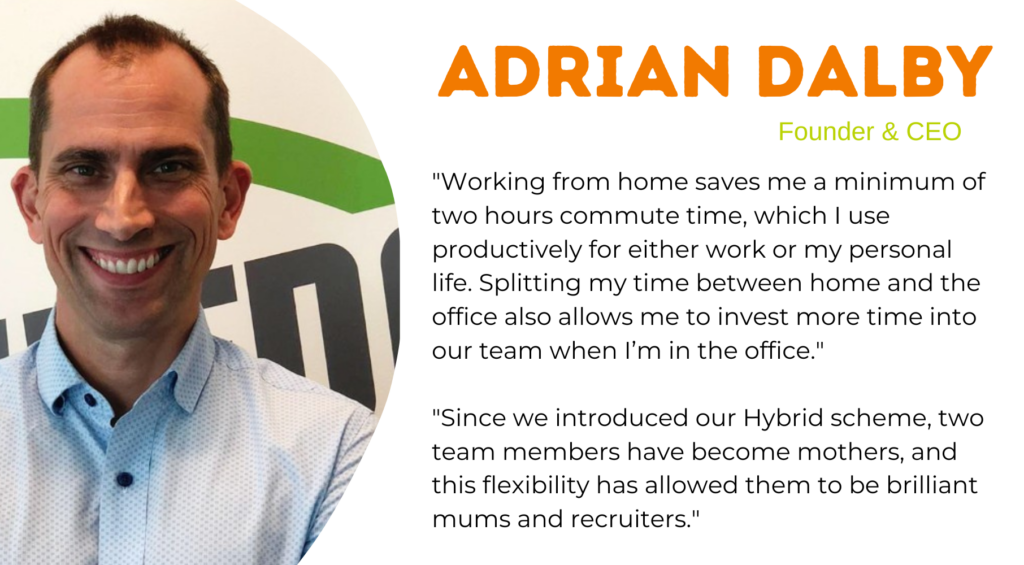
Top 5 Benefits:
Improved Work-Life Balance
Hybrid working has the potential to improve work-life balance by reducing the time employees spend commuting to and from work. James Howarth, a Senior Consultant at NC, says ‘It saves time and lets me see a bit more of my kids when I don’t have to commute on my WFH days.’
This flexibility has also allowed our Head of Consumer, Rachael Carver, to save one and a half hours per day on her commute. Which has allowed her to be more productive.
Divisional Manager Emma Forster agrees, saying, ‘Hybrid/ flexible working makes it possible for me to manage childcare. I wouldn’t be able to pick up from nursey or be home in time for his bath and bed routine. If I worked in the office five days a week, and this time is really valuable to me.’
Increased Flexibility
One significant benefit of adopting a hybrid model at NC is the increased control our team has over their work schedules and location. Associate Consultant Faye Rillstone says one of her favourite parts of our flexi scheme is the option to work abroad. This enables her to meet candidates and clients face-to-face in their own countries and explore.
Founder and CEO Adrian Dalby commented that ‘the team has been able to work abroad from around the world in France, Australia, Kosovo, Spain and more.’ He mentioned that another side to the increased flexibility is that ‘it’s now common to “jump on a teams call” both internally and with clients. This has significantly approved efficiency.’ Experiences like these allow companies to have higher retention rates and greater job satisfaction.



Reduced Costs
Commuting to the office can be costly and James says that working from home a few days a week can help save money on travel, lunch, or coffee. Transport is only getting more expensive, so by saving on this cost even once a week can be hugely beneficial to many employees.
Access to a Larger Talent Pool
This is a significant advantage for companies, as removing the location barrier allows them to search for the best candidate. Here at NC, we have built a diverse team with various perspectives.
Our Founder & CEO, Adrian Dalby said ‘this has given us more flexibility to hire people further afield. Henry, one of our Associate Consultants, worked part-time for us remotely while completing his master’s degree. Our brilliant Social Media Executive also lives over an hour from London.’
Seeing Colleagues
Since hybrid working involves splitting time between remote and in-office work. Meaning the team can look forward to seeing each other and catching up during their office days.
Rachael, Emma and Adrian mentioned that the team now gets a real buzz from going to the office and seeing everyone. Boosting their morale and teamwork, it’s the perfect set up.
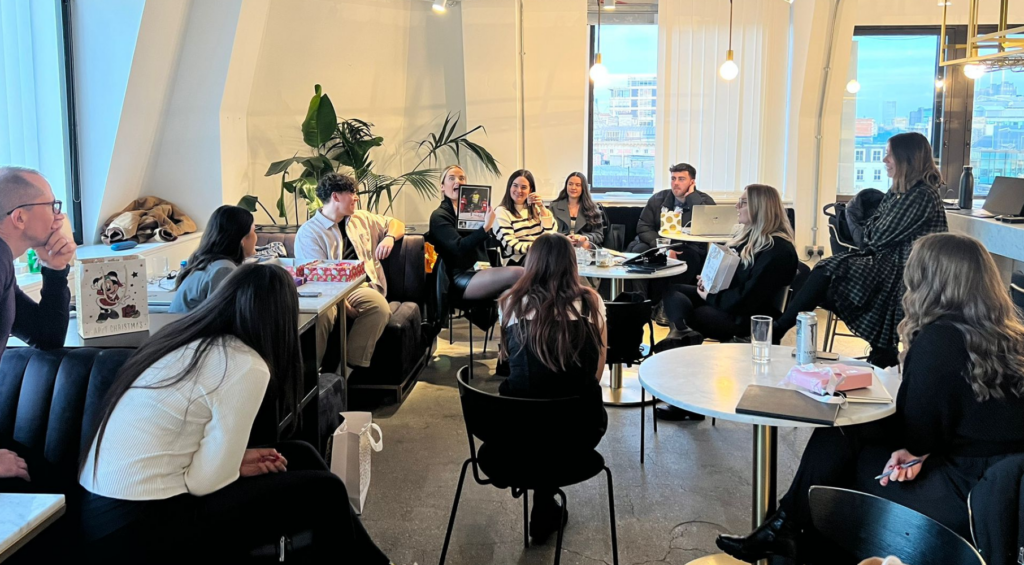
Overall, hybrid working offers numerous benefits for both employees and companies, and it has definitely enhanced the work-life balance for the entire team here at New Chapter. With reduced costs, increased productivity, and access to a wider talent pool, it is no surprise that many companies are now adopting this model. It is likely that hybrid working will become the new normal in the future.
If you’re looking for a new role, take a look at the current vacancies on our website. Many of which offer hybrid working or are completely remote.
-

5 Best AI Tools for Businesses 2023
Continue Reading5 Best AI Tools For Businesses 2023
In recent years, the rise of artificial intelligence (AI tools) have changed the way we work and communicate.
AI is not just about creating machines that do the work for us. But also developing intelligent systems that can reason, learn, and adapt to new info.
In this blog we will explore the top business AI tools that you can use in your everyday work life!
For the video editors
Murf offers a choice of over 120 text-to-speech voices in more than 20 languages. With this impressive tool, you can adjust the pitch, pronunciation and emphasis of your AI voice messages. This allows for a more personalised tone.
Modifying your own voice is also easy; with the ability to add pauses, changes in pitch, and alterations in speed. This tool is user-friendly and great for assisting your marketing and content creation team!
For copywriting
Jasper, the market-leading AI writing assistant, can create phrases, paragraphs or even write entire essays for you! You can either choose one of their 50 templates or give Jasper specific commands. From writing emails, blogs, press releases, and more with just a few words.
One of the most impressive features is that over time, this AI will learn and adapt to your writing style. Making it even easier to produce high-quality and personalised content quickly!

For the recruiters
Textio is perfect for recruiters, as it uses predictive technology to enhance job listings. This tool analyses words and scores documents based on their effectiveness. Allowing recruiters to attract a diverse range of candidates whilst also preventing gender bias. With this AI you can appeal to a wider pool and find the best person for the role.
For meetings
If you spend most of your meetings taking notes, consider using Fireflies. This AI meeting assistant instantly transcribes and records calls. Instead of struggling to remember every detail, you can simply search through the recording highlights to find the exact moment you need.
But that’s not all; Fireflies allows you to transcribe existing audio. Making it easy to revisit and review past conversations. With everything you need to organise yourself and make the most of each meeting. This tool can help you be more productive and efficient.

For everything else
Chat GPT is a powerful AI language model which uses deep learning to understand and generate natural, coherent text. As it continues to evolve and improve, it can be applied to a wide range of content from chatbots, language translation, and text completion. Best of all, it’s currently still completely free to use.
Are you interested in jobs in within the FMCG industry?
Here at New Chapter we have a selection of amazing consultants who spend each day helping individuals start new chapters within many sectors.
-

FMCG Interview Advice For Candidates
Continue ReadingInterview Advice for FMCG Candidates
Interviews allow employers to see if you’re a good fit for their role. But, they also give you an opportunity to see if their culture and job package is right for you!
From researching the company to getting feedback, make sure you construct a great first impression. Ace your next FMCG job interview by following this advice from our team of expert consultants in London.Preparation

“Remember, this is a two-way street. This is the perfect opportunity for you to find out more about the FMCG role, business, and company culture. Going prepared with some questions you want to know the answer to. Will not only help you make an informed decision, but help you come across as confident and engaged.” – Charli Harris, Recruitment Consultant
“Always have some questions prepared for the FMCG interviewer. These should be about the role and business, but also have one or two about them. Check out their LinkedIn beforehand and ask about a previous role, university, or why they joined the business. That tiny bit of prep will go a long way.” – Emma Forster, Divisional Manager – Drinks


“Always go to an FMCG interview with prepared examples to help the employer visualise the value you have added to the companies you have worked for. The best way to accomplish this is to provide them with an overview of the situation. Include what tasks or actions were performed, and, most importantly, the result or outcome. A tangible example can really bring your experience to life.”
“Be prepared to discuss what motivates you to apply for the position. Is it the business values, culture, their products or category? On many occasions, clients will go with the candidate who is the most enthusiastic or passionate, even if they don’t have all the skills required.” – Arbrie Hoxha, Divisional Manager – Consumer
“Research! Make sure you are familiar with the FMCG company by researching the size of the business, their website, where they sit in the market. A typical question in an interview is why do you want to work for the company. So, it’s always good to showcase your knowledge and this will help convey your interest to the interviewer.” – Rachel Sollis, Recruitment Consultant

Use your Recruiter

“Really use your recruiter to your advantage! They will have a good relationship with the line or hiring manager. Also they really understand what they’re looking for from a technical and personality standpoint. Ask them as many questions as possible. Then when you’re going into the interview, you feel like you already know who you’re meeting. If your interview process requires a presentation, send that to your recruiter. They can check it well in advance before sending it on to the client.
We have seen hundreds of presentations before, so we will be able to give feedback on the strengths and weaknesses. We know what the client will be looking for in those tasks. Even if it’s something as simple as a colour scheme change, so use our insight as much as possible!”– Shannon Milligan, Managing Consultant
Impression
“Think about first impressions. Make sure you are dressed appropriately for the job you’re interviewing for. Also make sure you use confident, accessible body language which will help the process and increase your self-confidence.” – Cristy Jennings, Recruitment Consultant

“Your mind will answer most questions when you’re calm and collected. You’re already confident in what you know, so relax.” – Faye Rillstone, Associate Consultant
“Be genuine. The interview process is as much about the FMCG company finding the right person as it is about the candidate finding the right company for them. Being true to yourself helps make sure that it’s the right fit on both sides.” – Rachael Carver, Head of Consumer

Culture Awareness

“Be aware of the company culture; make sure that you share the same values and not just the ideal skill set for the role. Ask questions directly related to your values to find out as much as you can. The correct work environment will allow you to achieve your goals and be more productive.” – Hannah Bugler, Associate Consultant
Feedback
“Pass on your feedback to your recruiter as soon as you finish your interview, whilst it’s still fresh in your mind. Plan to ask any questions that you might not have had the opportunity to ask during your interview. This also allows the company to see your interest in them.” – Katie O’Leary, Associate Consultant

Here at New Chapter we would love to help you find the best talent and achieve your goals. With experienced consultants across FMCG, Retail and more. Contact us today to discuss further!
-

Employer Interview Advice
Continue ReadingInterview Advice for Employers
Are you an employer looking to improve your interview technique?
Our experienced consultants at Team Leeds have shared their must-do interview advice to ensure you get the most out of your time with each candidate.
Putting the time and research into each potential employee will benefit both of you as this is a two-way process. You must appeal to candidates just as much as you’re looking for them to impress you!
“Always try and make constructive notes on how the interview goes. As an interviewer can you deliver any constructive feedback to help a candidate improve how they interview next time? Even if they’re not right for your role. Make sure to deliver constructive feedback to give the candidate a positive experience with your company” – Luke McDonnell, Managing Consultant


“In a candidate short market, don’t close yourself off to candidates who may not be the perfect candidate on paper. Can you look at ways to develop a candidate that ticks most of your boxes? Would this development plan be an attribute of attracting a candidate over their other opportunities and increasing staff retention in the long run?” – Jessica Kaur, Associate Consultant
“I’m pretty sure you’re looking to invest in the right person and have that person stick around for a while, so offer them what they deserve. Don’t lowball, you want them to join feeling valued.” – Lauren Milner, Senior Consultant

“Try to keep minimal time between 1st, 2nd and 3rd stages as good candidates tend to be off the market much quicker than the average candidate. By reducing this lead time, you maximise your chances of bringing this candidate onboard.” – Harry Toole, Recruitment Consultant
“Remember this is a two way process, if you like the candidate you’re interviewing don’t assume the feeling is mutual. They may have numerous other opportunities and therefore make sure you sell your business and the opportunity”– Mike Lowery, Managing Director

“At the moment it is very much a ‘candidate market’. Urgency is paramount as most candidates we speak to at the moment are in multiple processes or being approached daily, so if you like a candidate then please progress as quickly as possible so you don’t miss out on your preferred person.” – James Howarth, Senior ConsultantHere at New Chapter we would love to help you find the best talent and achieve your goals. With experienced consultants across FMCG, Retail and more, contact us today to discuss further!
-

Most Common Interview Questions
Continue ReadingHow to Answer the 10 Most Common Interview Questions
January and February are the most popular hiring months. Therefore you need to know how to answer the most common interview questions. Many companies aim for new goals and need fresh talent to achieve them.
Interviews can create a high-stress and an anxiety-induced setting, but a little practice goes a long way. Whilst we can’t guarantee what your employer will ask, put yourself ahead of the competition by preparing your answers in advance.
Below is our guide to the top 10 most common interview questions and the techniques you should use to answer them.
1. Tell me about yourself.
Of course, the classic start to an interview, with an open-ended question. To combat this, aim to tell a story about a relevant experience that led you to the profession or your educational background.
Mention your training and passion for the industry, allowing the employer to get a good first glance into how you fit the role.

2. What are your weaknesses?
Not only is this the most dreaded question, but it’s one of the most popular questions interviewers ask.
Normally used to determine self-awareness, so aim to choose a flaw that will not hinder or prevent you from your success in the role. Include a real example of how you’ve worked to improve or combat an issue. Your employer wants to see you working hard to overcome these weaknesses instead of them holding you back.
Examples could be that you have difficulty delegating, are detail-oriented, lack experience (entry-level), struggle to present, and multitask too much. All these allow you to expand and explain your plan to improve this weakness.
3. What is your greatest strength?
A question that’s almost always asked to determine your confidence and qualifications for the role. Don’t be too modest and ensure you sell yourself by truly believing you’re the best candidate for the job.
When answering make sure you tell a story and draw from personal experiences to show off your attributes.
4. Have you applied to other roles?
Employers use this question to discover your genuine interest in the role. They may want to know how far you are in the hiring process with other companies, meaning honesty is the best policy.
Avoid going too far into detail about other applications but do mention, if you have applied to other vacancies, that this role is the one you’re most excited about.

5. What are your salary expectations?
Before you apply, you should research the expected salary for your ideal position. Employers only use this question to ensure you fit their expectations and budget for the role. Yet an open-ended question like this can put you on the spot.
The key is to ensure you aren’t too specific and to allow room for negotiation. Make sure to aim higher than you would like, as it’s easier to negotiate down but don’t bring this up without a prompt from the interviewer. Asking a question like this too early can harm your chances with the company.
To work out your salary benchmark you can use our free FMCG salary guide now!
6. Where do you see yourself in 5 years?
This BIG question gives you the ability to explain your career goals in more detail. They want to find out if your five-year plan fits alongside theirs but also if you plan to commit to the company. So, when they ask this, they are saying, ‘What are your career goals in this position?’
Keeping your answer vague is the best choice, yes vague…! This is the ONLY question you want to prepare with a bland response. Talk about how you want to develop yourself as a professional and how you can see the role helping you achieve that. It should NOT include any hints towards leaving, owning a business, or simply stating ‘I don’t know’.

7. Why are you the best person for the job?
With this question, prepare to explain and advocate for yourself that you’re the ideal candidate.
A confident, concise response describing your experience and what you have to offer is key. Although, be sure your answer stays in line with the company’s values. Cater this reply to each separate role so you can show you are the perfect applicant every time.
8. Why are you leaving your current role?
This is a hard one to answer, with employers wanting to know if you left your previous job for genuine reasons.
Keep it positive, even if your departure was under difficult circumstances. For this, a direct response is best but ensure to imply your plans and give insight into what you’re looking to get out of your next role.
9. How do you handle stress and pressure in the workplace?

Be careful and avoid claiming you never feel pressure or experience stress. Instead, the best way to tackle this question is by acknowledging previous stressful situations and explaining how you dealt with them.
Examples of how you coped in high-pressure settings are more beneficial to employers than the short ‘I don’t get stressed’ response.
10. Can you explain this gap in your employment history?
Everyone has stages in their lives where their plans change, or they decide on a different path.
Avoid over-sharing and offer explanations to any queries your employer may have. Be sure to highlight any new skills you gained from your time away from the workplace.
Whilst we can’t guarantee these questions will appear in your interview. Our next advice would be to talk to an industry specific consultant, as they will be aware of typical questions that may arise.
We wish you the most success in your interview and if you’re still looking for that dream role.
Explore our current live vacancies or speak to our consultants below. -

New Year, New Career
Continue ReadingNew Year, New Career
As another year draws to a close, it’s not uncommon to start thinking about a new career and goals looking forwards.
Often the ‘new year, new you’ mentality takes over with many saying ‘next year I’ll sort that out’. This increases the amount of job seekers flooding the market in January and rises the level of competition. However, the steps you take now can significantly increase your chances of securing your dream role in the new year.
We have compiled 5 tips to help you prepare yourself before the new year job surge;
1. Clear out and update your social pages
Get ahead of the game before you start applying and update your social media profiles.
It isn’t uncommon for employers to view social platforms when assessing candidates. In fact studies have shown 70% of employers utilise the results to decide whether to move to the next stage. LinkedIn is a useful tool when job searching as many recruitment companies use the platform to find new candidates. Therefore, ensure first and foremost you have a profile. Secondly, make sure it is up to scratch and filled with as much detail as possible. Make the most of this platform with the tools and certified courses available online.
2. Chat with a recruiter
Speaking to a specialist recruiter in the industry can not only help you understand your options for salary, skills, and roles. It can also increase the potential range of more senior positions. Whilst many jobs are advertised on public platforms. The higher salary, senior roles may only be found through recruitment agencies. Utilise them to help you market your CV to the right employers. You can then increase your exposure and save time.

Here at New Chapter, we cover all sorts of roles across FMCG and Retail. Get in touch with one of our consultants today to discuss what you are looking for and explore potential roles.
3. Stay open minded

Having a flexible attitude toward your job search can expand your range of opportunities. It can often be a challenge but it is always worth considering a change of location or even career path, when searching.Whilst having a clear goal for your career is very important, and never a bad thing. Making sure to remain open minded and flexible can help lead you to the perfect role. For example, it can be easy to disregard a company’s culture if the role sounds perfect. But looking for a work environment that reflects your personal values will be more beneficial for your happiness in the long-term.
4. Beat the new year rush
With many feeling the back-to-work blues after the festive period, the level of competition heading into the new year is high.
Many don’t realise that December is a great time to start a job search, most employers keep a clearer work calendar around Christmas and spend time pre-planning for January to start the year with fresh talent and goals – so it is a great time to get yourself in front of an employer!
Candidates tend to postpone their searches until the new year but plan to leave current roles before that, for a longer break over the holidays or for a fresh start in January. So, take advantage of this key time in the year and get ahead of the competition!

5. Consider your long-term goals
Use the festive period to analyse your career goals, where do you want to be in the next five years? If you’re not on track to achieve this, what can change to ensure you get there?
Every role shapes your career so prepare yourself for interviews, put together a winning CV and explore ways to increase your skill set to ensure you can achieve that dream!
We would love to help you through each step of your career journey, all the way to landing that perfect role. Explore the live roles on our website now and chat to one of our consultants about your long-term goals.
With a wide range of exciting opportunities across FMCG and Retail, there is plenty of new avenues for you to explore and consider. Whether that be finding the perfect new company to be a part of or taking a bigger step by looking into a complete career change, what better time than the new year!
Subscribing to our job alerts or simply following us on social media, might be the difference to secure that role you’ve always dreamt of. With many vacancies going live each week, now is the perfect time to be looking for a new challenge.
